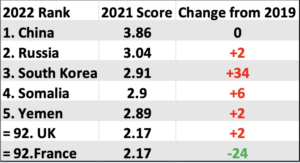Scottish rural affairs secretary Mairi Gougeon participated in a panel session last week at the World Ocean Summit and Expo in Portugal, alongside the deputy director-general of the World Trade Organisation (WTO) and the French ambassador to poles and oceans.

Cabinet secretary Mairi Gougeon with Melanise Siggs of the Global Seafood Alliance (GSA) at the summit. GSA is a key partner at the international Responsible Seafood Summit, which will be hosted in Scotland in 2024.
The panel discussed international treaties and agreements, including the WTO Agreement on Fisheries Subsidies and the United Nations Marine Biodiversity of Areas Beyond National Jurisdiction, as well as national action to support ocean health.
The WTO agreement, concluded after two decades of at times difficult negotiations, and on which the UK government took a strong lead, agreed to phase out the worst of the huge subsidies paid out by many governments to their distant-water fleets. Many vessels in the Chinese fleet in particular – confirmed last week as still the number one IUU nation in the world – were only profitable because of the subsidies they were receiving.
As well as IUU issues, many of the international distant water-fleet are also notorious for their human rights record, poor safety standards and appalling hygiene. The Chinese fleet was recently confirmed as leading the world’s catching nations, with an incredible 2.25 million tonnes of landings last year. This has a huge impact on world markets, affecting prices received by vessels fishing more responsibly. It may come as no surprise that China and Russia also pay the largest subsidies to their fishing fleets.

The table of shame: created by the Global Initiative Against Transnational Organised Crime, based in Switzerland, the IUU index ranks 150 fishing nations, from worst to best, on a range of criteria. Sweden and New Zealand have the lowest scores worldwide.
Speaking to the conference, the Scottish cabinet secretary highlighted her view that responsible nations need to push ahead with demonstrating responsible practices, saying: “The Scottish government is committed to meeting our international obligations regarding IUU fishing.
“At national level, we do not need to wait for international agreements, to ensure our fishers and marine environment are well managed, with effective monitoring and control procedures in place.”
The panel discussed ocean solutions to climate change, including reference to Scotland’s activity to maximise the potential of blue carbon habitats as a nature-based solution to climate change.
The cabinet secretary highlighted the role of Scotland’s National Marine Plan to support the challenges of congested marine space, and also noted the concept of just transition and the importance of working with coastal communities.
This story was taken from the latest issue of Fishing News. For more up-to-date and in-depth reports on the UK and Irish commercial fishing sector, subscribe to Fishing News here or buy the latest single issue for just £3.30 here.
Sign up to Fishing News’ FREE e-newsletter here.








